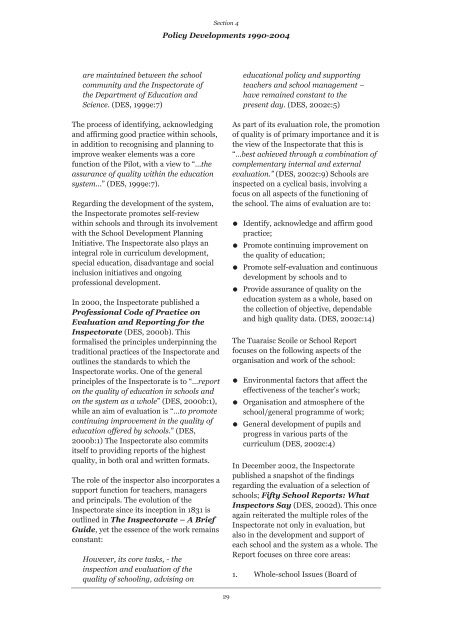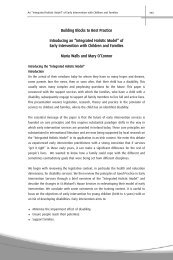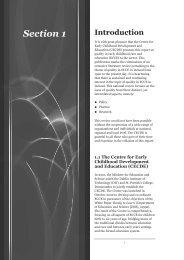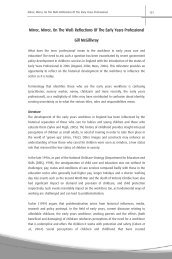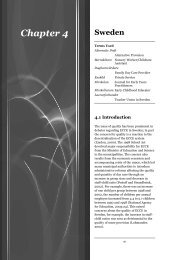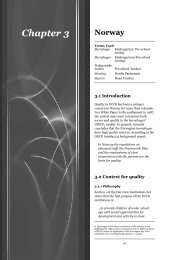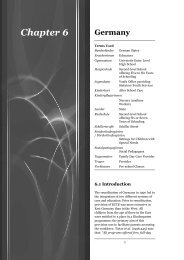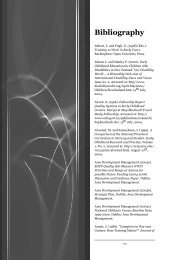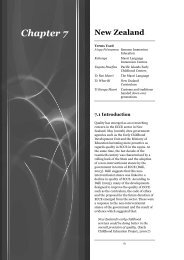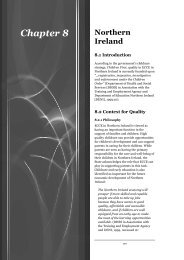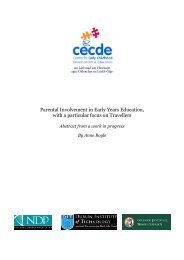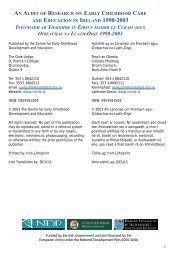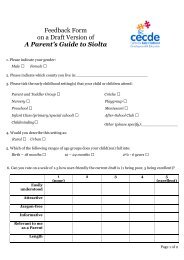Policy Developments 1990-2004 - Centre for Early Childhood ...
Policy Developments 1990-2004 - Centre for Early Childhood ...
Policy Developments 1990-2004 - Centre for Early Childhood ...
You also want an ePaper? Increase the reach of your titles
YUMPU automatically turns print PDFs into web optimized ePapers that Google loves.
Section 4<strong>Policy</strong> <strong>Developments</strong> <strong>1990</strong>-<strong>2004</strong>are maintained between the schoolcommunity and the Inspectorate ofthe Department of Education andScience. (DES, 1999e:7)The process of identifying, acknowledgingand affirming good practice within schools,in addition to recognising and planning toimprove weaker elements was a corefunction of the Pilot, with a view to “…theassurance of quality within the educationsystem…” (DES, 1999e:7).Regarding the development of the system,the Inspectorate promotes self-reviewwithin schools and through its involvementwith the School Development PlanningInitiative. The Inspectorate also plays anintegral role in curriculum development,special education, disadvantage and socialinclusion initiatives and ongoingprofessional development.In 2000, the Inspectorate published aProfessional Code of Practice onEvaluation and Reporting <strong>for</strong> theInspectorate (DES, 2000b). This<strong>for</strong>malised the principles underpinning thetraditional practices of the Inspectorate andoutlines the standards to which theInspectorate works. One of the generalprinciples of the Inspectorate is to “…reporton the quality of education in schools andon the system as a whole” (DES, 2000b:1),while an aim of evaluation is “…to promotecontinuing improvement in the quality ofeducation offered by schools.” (DES,2000b:1) The Inspectorate also commitsitself to providing reports of the highestquality, in both oral and written <strong>for</strong>mats.The role of the inspector also incorporates asupport function <strong>for</strong> teachers, managersand principals. The evolution of theInspectorate since its inception in 1831 isoutlined in The Inspectorate – A BriefGuide, yet the essence of the work remainsconstant:However, its core tasks, - theinspection and evaluation of thequality of schooling, advising oneducational policy and supportingteachers and school management –have remained constant to thepresent day. (DES, 2002c:5)As part of its evaluation role, the promotionof quality is of primary importance and it isthe view of the Inspectorate that this is“…best achieved through a combination ofcomplementary internal and externalevaluation.” (DES, 2002c:9) Schools areinspected on a cyclical basis, involving afocus on all aspects of the functioning ofthe school. The aims of evaluation are to:Identify, acknowledge and affirm goodpractice;Promote continuing improvement onthe quality of education;Promote self-evaluation and continuousdevelopment by schools and toProvide assurance of quality on theeducation system as a whole, based onthe collection of objective, dependableand high quality data. (DES, 2002c:14)The Tuaraisc Scoile or School Reportfocuses on the following aspects of theorganisation and work of the school:Environmental factors that affect theeffectiveness of the teacher’s work;Organisation and atmosphere of theschool/general programme of work;General development of pupils andprogress in various parts of thecurriculum (DES, 2002c:4)In December 2002, the Inspectoratepublished a snapshot of the findingsregarding the evaluation of a selection ofschools; Fifty School Reports: WhatInspectors Say (DES, 2002d). This onceagain reiterated the multiple roles of theInspectorate not only in evaluation, butalso in the development and support ofeach school and the system as a whole. TheReport focuses on three core areas:1. Whole-school Issues (Board of29


